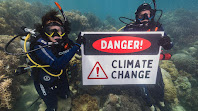The Great Barrier Reef on the Edge: The Climate Crisis
A dying miracle
The Great Barrier Reef, one of the world's most amazing natural wonders, is facing an existential threat. Recent research by leading climate scientists paints a bleak picture: without immediate and decisive action to combat climate change, we may have just 25 to 30 years left to enjoy this vibrant ecosystem.
Blame: temperature increase
The main reason for the shrinking of the reef is the increase in global temperature. As our planet warms, ocean temperatures rise dramatically, leading to a phenomenon known as coral bleaching. When corals bleach, they lose the symbiotic algae that provide them with food and color. Prolonged bleaching can be fatal, causing mass coral die-offs.
Universities sound the alarm
Numerous universities and research institutions around the world have contributed to our understanding of the crisis facing the Great Barrier Reef. Their findings consistently point to climate change as a major driver of coral reef degradation.
Human error: a costly mistake
Human activities such as burning fossil fuels, deforestation and industrial pollution are the main drivers of climate change. These actions have resulted in the release of unprecedented amounts of greenhouse gases into the atmosphere, trapping heat and causing global temperatures to rise.
Where is the Great Barrier Reef?
The Great Barrier Reef, located off the coast of Queensland, Australia, is the largest coral reef system in the world. A huge number of sea creatures live here, including thousands of species of fish, corals and molluscs.
The fate of the Great Barrier Reef is a stark reminder of the urgent need to address climate change. We must reduce our carbon footprint, support renewable energy sources and advocate for policies to protect our planet. By taking action now, we can preserve this iconic natural treasure for future generations.




Comments
Post a Comment